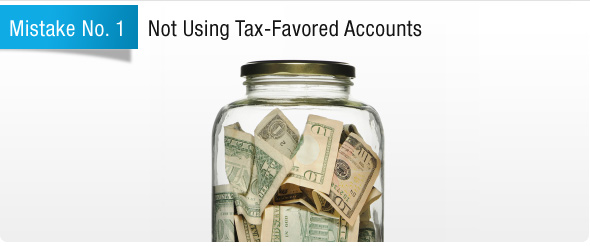8 Tax Mistakes You Can't Afford to Make
As the April 15 tax-filing deadline approaches, you're running out of time to get your taxes done. But smart tax planning doesn't start in April. To truly get on top of your taxes, you need to always be thinking ahead. As you prepare your 2012 return, don't forget about changes you can do right now to make your 2013 tax situation a lot better.
The best way to make taxes a lot less painful is to avoid making unnecessary mistakes. Below, we'll look at eight things taxpayers commonly do wrong that can cost them thousands of dollars in extra taxes.

Recommendation: Pay less in taxes by using the many special tax-favored accounts that the IRS allows.
- IRAs, 401(k) plans, and other employer-sponsored retirement accounts.
- 529 plans and Coverdell Education Savings Accounts, which offer tax-free growth when proceeds are used for approved expenses.
- Health savings accounts and flexible spending accounts provide tax benefits for your medical spending.
Bottom line: Not using these accounts is like handing over free money to Uncle Sam.

Recommendation: When possible, opt for longer holding periods, since the capital gains rate you pay depends on how long you held the investment.
- Hold an investment less than a year, and you'll pay your ordinary rate of as much as 39.6% this year.
- Hold it more than a year, and the maximum is 20%, with many taxpayers paying lower rates of 15% or even 0%.
Bottom line: Long-term investing can be rewarding.

Recommendation: You must have enough tax withheld from your paycheck to cover most of your tax liability when you file your return.
- If you don't withhold enough, you'll pay penalties and interest on what you should have paid in estimated taxes.
Bottom line: It's too late to fix for the 2012 tax year, but be sure to look up Form 1040-ES to make sure you're in good shape this year.

Recommendation: If you have tax-favored accounts, make sure you use them wisely.
- High-income bonds, as well as real estate investment trusts Annaly Capital (NYSE: NLY ) and American Capital Agency (NASDAQ: AGNC ) produce income that's typically taxed at high ordinary-income rates, and so they often do best in IRAs rather than taxable accounts.
- By contrast, a low- or no-dividend stock that you buy and hold for decades may actually cost you more in taxes in an IRA than a taxable account.
Bottom line: Position your investments to make the most of available tax savings.

Recommendation: Be smart about harvesting tax losses, timing deductible expenses, or deferring taxable income.
- Late last year, many taxpayers did their best to pull income into 2012 and leave deductions for 2013 in order to capture lower 2012 tax rates and reduce their 2013 tax liability.
Bottom line: With taxes, timing is key.

Recommendation: Be sure to consider special tax rules for certain investments
- For instance, precious-metals investors need to be aware that because of their structure,SPDR Gold (NYSEMKT: GLD ) and iShares Silver (NYSEMKT: SLV ) have their gains taxed as collectibles, which carries a higher rate on capital gains even if you hold the shares for more than a year.
- Selling too soon after receiving a dividend can take away the lower tax rate on your payout.
Bottom line: Be careful before you sell.

Recommendation: Be sure you have the records to back up the figures on your return so that you can defend your filing during a possible audit.
- Many tax benefits require documentation to prove that you're entitled to them.
- For instance, when you give to charity, you should get an acknowledgment letter showing that you made a donation and didn't get anything of value for it.
- But with some donations, such as gifts of vehicles or expensive property, further documentation or even a formal appraisal may be necessary.
Bottom line: Forewarned is forearmed.

Recommendation: Even if you can't pay, you should still file in order to avoid huge penalties.
- The penalty for not filing is 10 times as much as the penalty for not paying on a filed return.
Bottom line: Even if you are in financial straits, save yourself some big money and prepare your return anyway.
No comments:
Post a Comment